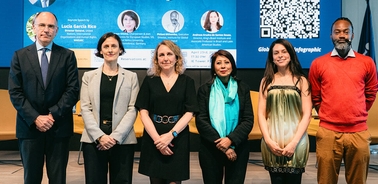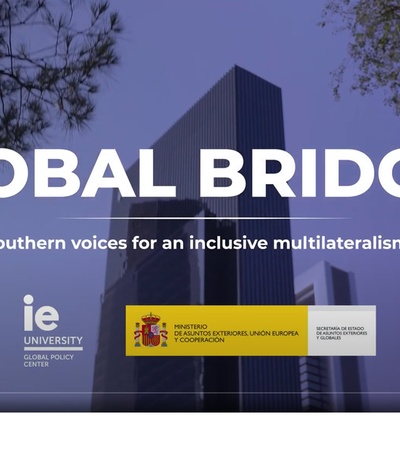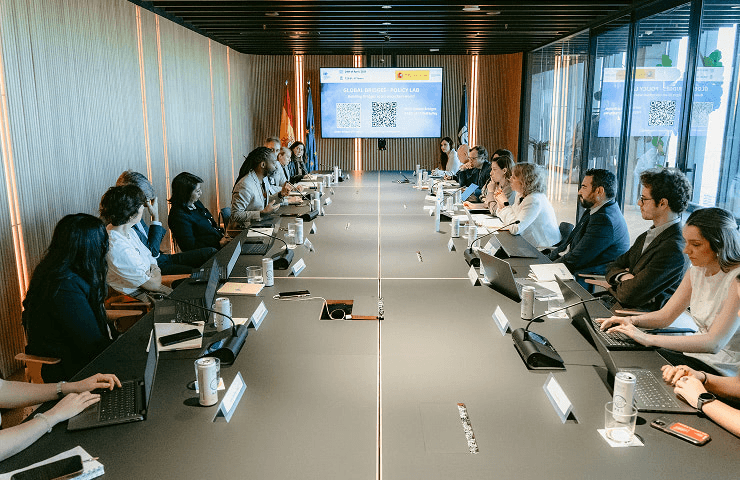Global Bridges: Southern Voices for an Inclusive Multilateralism – A Call to Rethink and Reform Global Governance

On April 23–24, 2025, IE University’s Global Policy Center hosted Global Bridges: Southern Voices for an Inclusive Multilateralism, a two-day gathering dedicated to addressing the pressing challenges of today’s multilateral system. The event brought together policymakers, academics, and experts from Spain, the European Union, and the Global South to explore how inclusive reform can pave the way for a fairer and more resilient global order.
The public conference opened with welcome remarks from Enrico Letta, Dean of the School of Politics, Economics, and Global Affairs at IE University, and a keynote speech by Lucía García Rico, Director General for United Nations, International Organizations, and Human Rights at Spain’s Ministry of Foreign Affairs, European Union, and Cooperation.
Moderated by Ilke Toygür, Director of the Global Policy Center, the high-level panel included Philani Mthembu, Executive Director at the Institute for Global Dialogue, Ummu Salma Bava, Professor and Jean Monnet Chair at the Jawaharlal Nehru University, and Andreza Aruska de Souza Santos, Director of the King’s Brazil Institute at King’s College London.
The second day continued with a closed-door Policy Lab, where strategic foresight, innovative policy ideas, and the role of emerging powers were explored in depth.
Spain: Defending Multilateralism through Inclusive Reform
Lucía García Rico articulated Spain’s strong commitment to protecting and reforming the multilateral system. In her keynote address, she described the profound crises facing multilateralism today—growing geopolitical fragmentation, rising transactionalism, and a retreat from collective commitments—while stressing that multilateralism remains the most effective avenue for addressing global challenges such as pandemics, climate change, food insecurity, and armed conflicts.
Spain, she emphasized, sees the defense of a rules-based multilateral system as a duty, much like defending health, development, or the environment as global public goods. Spain is advocating for strengthening the United Nations, enhancing the legitimacy of international institutions, and ensuring that principles such as international law, including international humanitarian law, and human rights remain central. Spain also backs the urgent reform of the UN Security Council by expanding representation to Africa, Latin America, and Asia, abolishing the veto, and pursuing a more democratic and inclusive decision-making structure. The Uniting for Consensus (UfC) initiative, in which Spain actively works on, reflects these priorities.
Additionally, the Director General called for stronger global governance in new domains like artificial intelligence, where unregulated developments could jeopardize privacy, democracy, and rights. Spain advocates for placing the international governance of AI under the framework of the United Nations to ensure it remains people-centered and globally legitimate.
South Africa: Aligning Priorities for Inclusive Global Growth
Philani Mthembu, Executive Director of the Institute for Global Dialogue, shared South Africa’s vision for aligning its leadership of the G20 with broader objectives for global reform. He explained how South Africa’s presidency is a continuation of previous Global South-led G20 presidencies, focusing on equality, sustainability, and inclusive growth.
Mthembu highlighted critical minerals and debt sustainability as two priority areas where collaboration between the EU and South Africa could make a significant impact. He stressed that the beneficiation of critical minerals must ensure that extracted resources benefit local populations, not just external markets. Moreover, addressing the high cost of finance and fostering debt sustainability are essential steps to advancing sustainable development goals.
The recent EU–South Africa Summit reaffirmed shared priorities in critical minerals, climate finance, and debt management, demonstrating a renewed European effort to engage meaningfully with South Africa’s leadership within global governance frameworks.
Brazil: Embracing Complexity for Multilateral Resilience
Andreza Aruska de Souza Santos, Director of the King’s Brazil Institute, discussed Brazil’s evolving role as both a regional leader and a global actor. She emphasized the importance of recognizing Brazil’s internal complexities—where social movements and community resilience shape its political landscape—and how this richness must inform Brazil’s contributions to global governance.
Andreza argued that multilateralism must become more attuned to complexity, embracing different levels of partnerships, voices, and scales of engagement. She warned against viewing Brazil, or any emerging power, through a simplistic lens and insisted that the global governance architecture must allow for a broader, more intricate representation of societies. Strengthening South–South cooperation and fostering regional integration in Latin America are key components of Brazil’s strategy for supporting global goals and reimagining a more inclusive multilateral system.
India: Reframing Multilateralism for a Rapidly Evolving World
Ummu Salma Bava, Professor at Jawaharlal Nehru University, presented India's reflections on the future of multilateralism. She portrayed a world marked by accelerating change, where institutions created 80 years ago no longer reflect today’s economic and political realities.
Bava underlined that the current multilateral system is broken and asymmetric, leading states to pursue ad hoc, interest-driven solutions instead of collective responses. However, she noted that India’s vision—exemplified by its G20 slogan "One Earth, One Family, One Future"—emphasizes the need for an inclusive and reformed multilateral order. Reforming the United Nations Security Council remains a cornerstone of India's agenda, recognizing that static institutions must evolve to accommodate shifting power dynamics.
Bava also explored the growing importance of issue-based coalitions that allow for flexible alliances on critical global issues. Yet, she cautioned that these new forms of cooperation must not undermine efforts to build more durable and inclusive institutions.
The European Union: Balancing Values, Strategic Autonomy, and Pragmatism
Throughout the discussions, European voices reflected on the challenges the EU faces in a rapidly multipolarized world. The EU must develop strategies for a world order that is more eclectic than simply multipolar: one combining liberal norms, transactional relationships, and spheres of influence.
While defending a values-based approach to international cooperation, the EU must also acknowledge its transactional instincts and foster targeted partnerships, particularly in emerging technologies and strategic industries. European strategic autonomy and global engagement must be pursued hand-in-hand, recognizing that flexibility and selective alliances are increasingly essential.
A recurring theme was the need for the EU to listen more carefully to partners in the Global South and to present itself not just as a normative actor but as a strategic collaborator capable of building inclusive, balanced partnerships beyond the traditional West–Rest dichotomy.
Building Global Bridges for an Inclusive Future
The Global Bridges initiative reaffirmed the urgent need for strategic foresight, innovative thinking, and inclusive dialogue to strengthen the multilateral system. As multilateral institutions approach their 80th anniversary, the call for reform, equity, and resilience has never been clearer. At the Global Policy Center, we remain committed to facilitating the conversations and connections that are crucial for building a more effective and inclusive international order.

